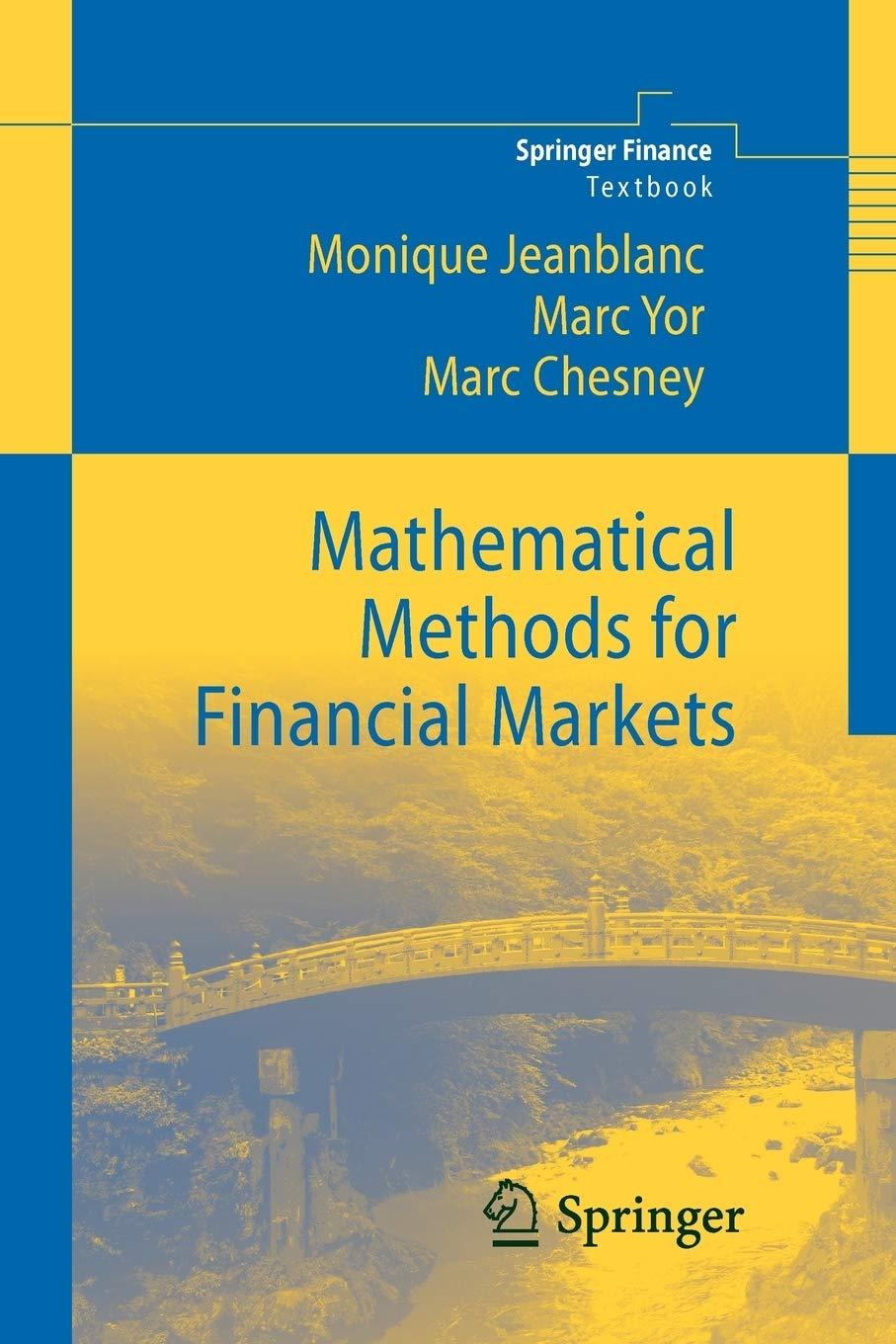We present an example where the representation of a bounded r.v. considered as the terminal variable of
Question:
We present an example where the representation of a bounded r.v. considered as the terminal variable of a martingale can be explicitly computed. Let \(B\) be a Brownian motion and \(T_{a}=\inf \left\{t \geq 0: B_{t}=a\right\}\) where \(a>0\).
1. Using the Doléans-Dade exponential of \(\lambda B\), prove that, for \(\lambda>0\)
\[\begin{equation*}\mathbb{E}\left(e^{-\lambda^{2} T_{a} / 2} \mid \mathcal{F}_{t}\right)=e^{-\lambda a}+\lambda \int_{0}^{T_{a} \wedge t} e^{-\lambda\left(a-B_{u}\right)-\lambda^{2} u / 2} d B_{u} \tag{1.6.3}\end{equation*}\]
and that
\[e^{-\lambda^{2} T_{a} / 2}=e^{-\lambda a}+\lambda \int_{0}^{T_{a}} e^{-\lambda\left(a-B_{u}\right)-\lambda^{2} u / 2} d B_{u}\]
Check that \(\mathbb{E}\left(\int_{0}^{T_{a}}\left(e^{-\lambda\left(a-B_{u}\right)-\lambda^{2} u / 2}\right)^{2} d u\right)<\infty\). Prove that (1.6.3) is not true for \(\lambda<0\), i.e., that, in the case \(\mu:=-\lambda>0\) the quantities
\(\mathbb{E}\left(e^{-\mu^{2} T_{a} / 2} \mid \mathcal{F}_{t}\right)\) and \(e^{\mu a}-\mu \int_{0}^{T_{a} \wedge t} e^{\mu\left(a-B_{u}\right)-\mu^{2} u / 2} d B_{u}\) are not equal. Prove that, nonetheless, \[e^{-\lambda^{2} T_{a} / 2}=e^{\lambda a}-\lambda \int_{0}^{T_{a}} e^{\lambda\left(a-B_{u}\right)-\lambda^{2} u / 2} d B_{u}\]
but \(\mathbb{E}\left(\int_{0}^{T_{a}}\left(e^{\lambda\left(a-B_{u}\right)-\lambda^{2} u / 2}\right)^{2} d u\right)=\infty\). Deduce, from the previous results, that \[\sinh (\lambda a)=\lambda \int_{0}^{T_{a}} e^{-\lambda^{2} u / 2} \cosh \left(\left(a-B_{u}\right) \lambda\right) d B_{u}\]
2. By differentiating the Laplace transform of \(T_{a}\), and using the fact that \(\varphi\) satisfies the Kolmogorov equation \(\partial_{t} \varphi(t, x)=\frac{1}{2} \partial_{x x} \varphi(t, x)\), (see \(\longmapsto\) Subsection 5.4.1), prove that \[\lambda e^{-\lambda c}=2 \int_{0}^{\infty} e^{-\lambda^{2} t / 2} \partial_{t} \varphi(t,c) d t\]
where \(\varphi(t, x)=\frac{1}{\sqrt{2 \pi t}} e^{-x^{2} /(2 t)}\).
3. Prove that, for any bounded Borel function \(f\)
\[\mathbb{E}\left(f\left(T_{a}\right) \mid \mathcal{F}_{t}\right)=\mathbb{E}\left(f\left(T_{a}\right)\right)+2 \int_{0}^{T_{a} \wedge t} d B_{s} \int_{0}^{\infty} f(u+s) \frac{\partial}{\partial u} \varphi\left(u, B_{s}-a\right) d u\]
4. Deduce that, for fixed \(T\), \[\mathbb{1}_{\left\{T_{a}
Step by Step Answer:

Mathematical Methods For Financial Markets
ISBN: 9781447125242
1st Edition
Authors: Monique Jeanblanc, Marc Yor, Marc Chesney





